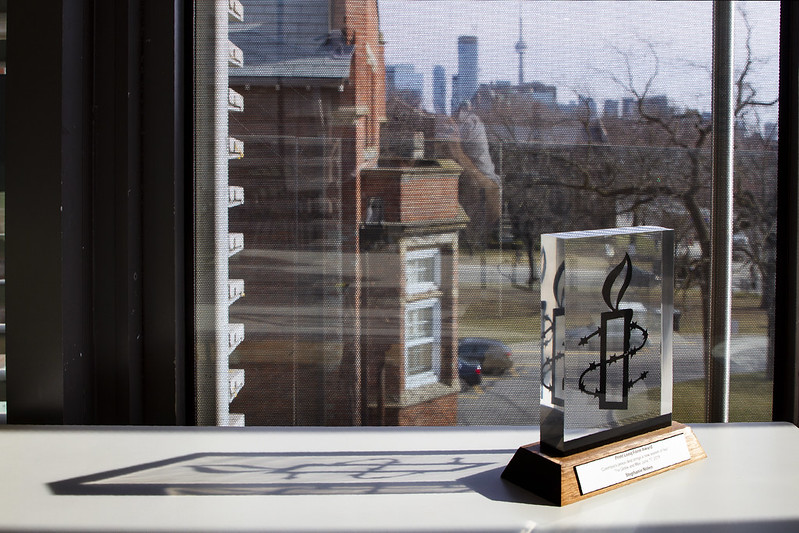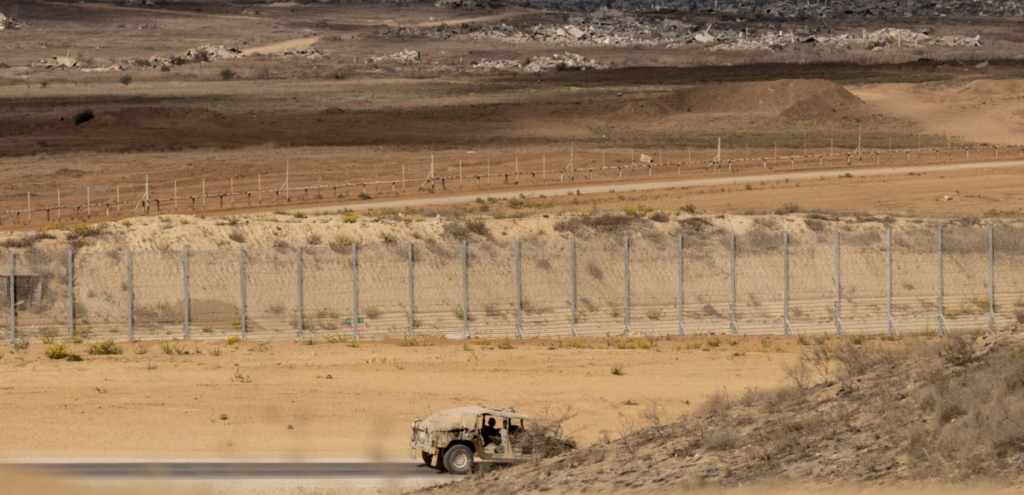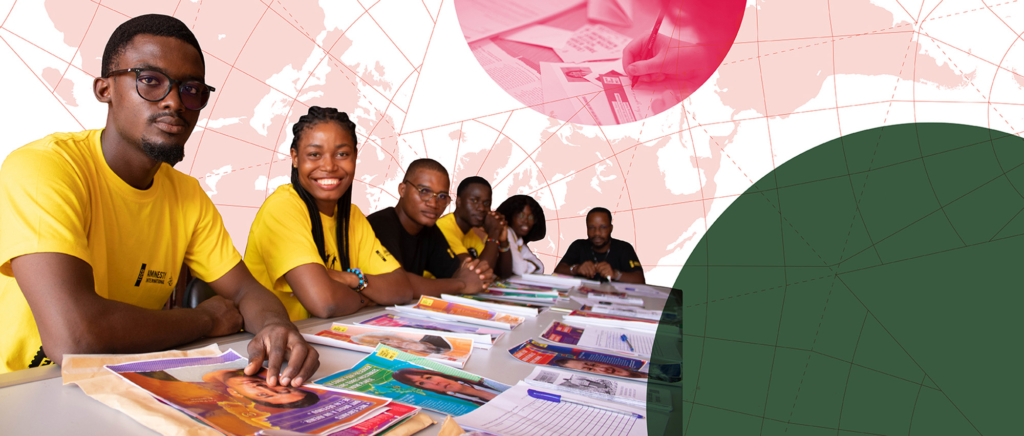OTTAWA – Amnesty International is thrilled to announce the winners of the 26th annual Amnesty International Media Awards in Canada. These awards recognize outstanding human rights reporting by journalists in Canada and Canadian journalists abroad.
- Mixed Media: Stephanie Nolen, Félix Márquez, Laura Blenkinsop, Jeremy Agius and Timothy Moore, The Globe and Mail, Gone
- Short-Form Video: Rudy Gauer, Emma Prestwich, Broadview, Putting Down Roots
- Long-Form Video: Martin Himel, TVO, The Arrest
- Long Form Audio: Mary Lynk, CBC Radio’s Ideas, I Will Never See The World Again
- Written News: Valérie Ouellet, Joseph Loiero, CBC News: Investigative Unit, COVID-19 taking a toll in prisons, with high infection rates, CBC News analysis shows
- Written Feature: Sara Mojtehedzadeh, Toronto Star, Amazon warehouse workers in Canada saw injury rates double. Then COVID hit. Inside a hidden safety crisis
- Post-Secondary Youth Award: Sakeina Syed, Excalibur (York University community newspaper), It’s time to unmask your bigotry
- Secondary Youth Award: Sophia Rottman, Tigertalk (the newspaper of Harbord Collegiate Institute), The Crossroad of Sports and Politics: Boycotting the 2022 Beijing Olympics
The Globe and Mail’s Gone project is a deep exploration of those disappeared in Mexico, as told by the people they left behind. A large team put together this impressive story, with reporting by Stephanie Nolen and Félix Márquez and digital storytelling by Laura Blenkinsop, Jeremy Agius and Timothy Moore.
“The use of multi-media was so intentional and impactful — short videos of family members of those disappeared speaking in their own language, for instance, put people first in the story, following many heartbreaking stories of how they found out their loved ones were not just missing, but dead and buried in a clandestine gravesite,” said Sadiya Ansari, an Amnesty International Media Awards judge and co-founder of Canadian Journalists of Colour.
Broadview Magazine’s Putting Down Roots – filmed and edited by Rudy Gauer and produced by Emma Prestwich – depicts Operation Ezra, a multi-faith sponsorship initiative that provides Yazidi refugees the opportunity to farm on donated land in Manitoba.
Judges Sadiya Ansari, Shree Paradkar and Olivia Ward wrote that the video was a “human and beautifully humane piece that scores high in all categories. It makes the most of its short format to show how one multi faith project, named Ezra, applied the proverb ‘give a man a fish, and you feed him for a day. Teach a man to fish, and you feed him for a lifetime.’”
Martin Himel’s The Arrest, broadcast on TVO, unpacks the permanent damage that is done by the arrest and judicial process when vulnerable citizens, because of their race or social status, are wrongly charged. The stories are linked by the dedicated efforts of Toronto lawyer Davin Charney, who was drawn to the work by his own experience. The documentary follows Charney in his meetings representing the wrongly charged, shows him demanding justice and winning compensation.
“It is a noble effort that is given special meaning by the skilled, powerful presentation of the stories in this very well produced documentary,” wrote John Tackaberry, a judge and Amnesty International Canada’s former media relations officer.
CBC Radio’s Ideas tells the story of Turkish journalist Ahmet Altan, who is among thousands of journalists, writers, academics and other political prisoners imprisoned under President Recep Tayyip Erdogan’s regime. Featuring interviews with Altan’s loved ones and lawyer, and words directly from his memoir, producer Mary Lynk helps paint a picture of one journalist who has found a way of rising above his imprisonment.
“The story and writing of Ahmet Altan makes the point that imprisoning people’s bodies can’t crush their resistance, their thoughts and their spirit. And the combination of philosophical, literary and human rights issues was masterfully done,” wrote Media Awards judges Karyn Pugliese, Olivia Ward and John Tackaberry.
For the Toronto Star, reporter Sara Mojtehedzadeh documents the plight of Amazon warehouse workers who are treated as disposable. At Amazon warehouses in Canada, workers endure injuries, illness and violations of their rights daily amid terrible working conditions.
“This is a story of ‘crushing workers and cutting bonuses’ during a deadly pandemic in which immigrants and racialized people are especially vulnerable. Mojtehedzadeh has blazed a trail in Canadian labour justice reporting — an area that has been badly neglected since labour beats were superseded in the media in favour of ‘business news,’” wrote Amnesty Media Awards judges Olivia Ward, Parsa Mahmud and Sadiya Ansari.
Reporter Valérie Ouellet and producer Joseph Loiero investigate the toll of COVID-19 on prison populations in Canada, demonstrating how provincial and federal governments failed to take measures that could have protected vulnerable inmates.
“It accomplished what good journalism strives for: giving a voice to the vulnerable, truth-seeking, and ultimately holding those in power accountable for their (in)action,” said Karyn Pugliese, a Media Awards judge and journalism professor at Ryerson University.
In her editorial for Excalibur, a student-run newspaper at York University, Sakeina Syed calls into question the hypocrisy of the Canadian government when it comes to religious versus safety-designed face coverings.
“Using razor-sharp logic and compelling storytelling, Syed effectively makes her case that face coverings do not impede the safety of citizens and that there is no reason – other than blatant racism – that Muslims in Quebec have been denied the right to wear them for so long,” wrote Samantha Fink, a former Amnesty International Media Award winner and current judge.
Lastly, Amnesty International is elated to announce the winner of the first-ever Secondary Youth Award. Sophia Rottman’s story for Tigertalk, Harbord Collegiate Institute’s student newspaper, highlights the moral dilemma surrounding attendance at the 2022 Beijing Olympics, where human rights abuses against Uighur Muslims have been rampant.
“The article dealt with a problem that is all too common today: whether – and how – we can separate our experiences from the actions of those who design them. This story opens its readers’ minds, allowing us to look at how sports are about more than entertainment: they are an opportunity for unity, teamwork, and action,” said Media Awards judge Samantha Fink.
The winners will be honoured during a virtual ceremony on May 27 at 7:30 p.m. on Zoom and the Amnesty International Canada Facebook page. Amnesty International is also pleased to announce that Nahlah Ayed, an award-winning journalist and host of CBC Radio’s Ideas, will host this year’s event.
Amnesty International would like to recognize and honour the judges* who put a tremendous amount of time and effort into reviewing this year’s Media Awards submissions. We could not have done it without them. They are:
- John Tackaberry, who served as Amnesty International’s Media Officer for more than 20 years and worked for many years as a journalist before that. The Media Awards were John’s vision and he has served as a judge from the inception, including now in his retirement.
- Sadiya Ansari, whose work has appeared in numerous newspapers and magazines, including the Guardian, Chatelaine, Toronto Star and Maclean’s. She is the co-founder of Canadian Journalists of Colour.
- Shree Paradkar, the Toronto Star’s race and gender columnist, and two-time winner of Amnesty Canada’s Media Awards.
- Adrian Harewood, the cohost of CBC Ottawa News at 6, the station’s local weekday supper-hour television newscast.
- Karyn Pugliese, an award-winning journalist best known for her role as Executive Director of News and Current Affairs with APTN. She is currently a member of Ryerson University’s journalism faculty.
- Olivia Ward, a retired Toronto Star foreign affairs reporter who covered human rights issues extensively in her career. She was the host of the 2017 Amnesty Canada Media Awards.
- Samantha Fink, winner of the 2019 Amnesty Canada Youth Media Award for her article on Queen’s University students with invisible disabilities facing challenges on campus, which was published in The Journal.
- Parsa Mahmud, a University of Toronto student pursuing a Bachelor of Arts degree with a double major in Economics and Public Policy, and former co-editor of Amnesty International’s first human rights youth newspaper, The Matchstick.
*Note: In order to avoid any real or perceived conflict of interest, no judges served on panels for categories in which they had submitted entries themselves or were personally or professionally affiliated with others who had done so.
Media contact: Lucy Scholey, Media Relations, Amnesty International Canada, 613-853-2142, lscholey@amnesty.ca























